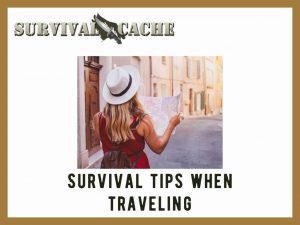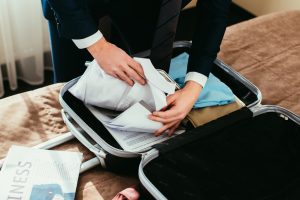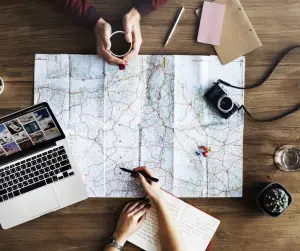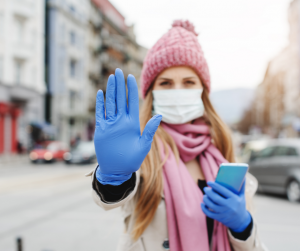Being prepared for bad situations can be difficult during the best of times when we are at home. Being prepared when we are traveling is a whole different ball game.

Traveling exposes us to unfamiliar territory, people, and places. All the while having limited resources.
Some people travel for business, but many do so for pleasure. It is a means of resetting or unwinding and to enjoy and experience new things.
Unfortunately, this is not the time to completely let your guard down, quite the opposite. After all, if we take certain precautions at home that pertain to our safety, why would we not do the same elsewhere?
To help get you into the right mindset, we have put together a list of recommendations of things you should or should not do while traveling.
SKIP AHEAD
Survival Tips when Traveling
Inform Others
Telling others about travel plans is a common practice but I suggest giving them even more information than normal.
Before leaving on your trip leave a list of information with someone you trust such as a family member or close friend.
Firstly, this lets others know that you will be out of town.
Secondly, it gives others better leverage in helping you should something go wrong while you are away.
Here are some items that should be included in the list of information.
- When you are leaving and when you are returning
- Information regarding transportation such as flight numbers and departure and arrival times
- Phone numbers and addresses of hotels you will be staying at
- Phone numbers of the local authorities
- Detailed itinerary of the places you intend on visiting
- Set up scheduled check-in times every day or every other day just to let others know everything is going alright
Important Documentation
Depending on where you are traveling, you may be required to have certain documentation with you. This can be things like a photo I.D., passport, and a medical card.
It is a good idea to make two copies of the documentation you plan on taking with you. The first set of copies should be given to the trusted individual as mentioned above. The second set of copies should be taken with you in case something should happen to the originals.
Some locations may require this documentation to be always carried on your person within their borders. If this is the case, do not pack these into a bag that you intend on carrying around. Bags are easily stolen.
Instead, carry important documents in a secured pocket on the front of your body or in a concealable pouch that can be worn under your clothes. If documentation is not required to be carried on your person then it may be safer to keep it in a secured safe that many hotels offer.
Mind your Appearance
There is a saying, “don’t look like a tourist.” The stereotypical tourist sticks out in a crowd and therefore makes them an easy target to those with bad intentions.
You can avoid this in several ways.
Do not dress like you have money, but rather blend in. If the locals are wearing blue jeans and t-shirts, do not walk around wearing an $800 name brand outfit.
Ditch the jewelry while you are at it. Jewelry is an indication that you have money not to mention the monetary value of the jewelry itself. Even “fake” jewelry should not be worn because it can be difficult to distinguish between it and the real thing.
Use Pockets Not Bags
When out and about in a new destination keep money and other important items in your pockets rather than in a bag.
Setting a bag down and forgetting about it is an easy thing to do. It is also just as easy for someone to pick it up without you noticing.
Even purses or bags with a shoulder strap can be removed from a person’s grasp without much of a struggle. Pockets that are on the front of your body and that have a closure like a zipper, or a button are the best choice for keeping items safe.
Research the Area
When arriving in a new area it is good to get a “lay of the land.”
This simply means to become familiar with the surroundings. Some of this research can be done before your trip while some of it will have to be done upon arrival.
A good way to do this is to purchase a map of the area you are going to be visiting. Become familiar with the names of streets, buildings, businesses, and landmarks. When studying the map compare it to pictures of the same area that can be found on the internet or in books.
Mark important locations on the map such as hospitals, police stations, an embassy, and where you will be staying.
It is also certainly worthwhile to be knowledgeable about a region’s natural activity.
For instance, find out if the area is prone to earthquakes, tsunamis, hurricanes, and other extreme events. Once on the ground, take a little bit of time to put a plan into place for what you would do and where you could go if one of these events were to happen.
Additionally, once you arrive at your destination you should take the time to talk to locals about the area. Local people are a wealth of information and can inform you as to which areas are safe to visit and which areas are best to avoid.
Domestic Travel
Having certain gear with you while traveling can be difficult or even next to impossible, especially when traveling by plane.
But many people travel domestically and enjoy doing so by taking road trips.
Unless someone is specifically planning on spending time in the outdoors, people tend to not pack preparedness supplies, which is a bit confusing.
When traveling in a vehicle the option of packing gear is not only available, but the great thing is that the vehicle does all the work of hauling it! It is for this reason that there is no excuse for not having emergency supplies when going on a road trip.
Additionally, much of what was discussed earlier in the article applies even when a person is traveling in their own “backyard.” Traveling just a small distance, say 100 miles from your home and you can find people that speak, act, and appear different.
Environments and customs can change dramatically from location to location within a country and there is no reason to think being prepared should be ignored.
Lock Downs
Traveling is not as carefree as it used to be, and the movement of travel can unexpectedly be restricted. In recent times, many countries have been known to and quickly lockdown due to violence, a public health scare, or some other form of disaster.
What would you do if you were in a different state or country when it was suddenly locked down? Here are a few questions to ask yourself and to plan for when traveling.
Do you have friends, family, or know of anyone in the area that you could stay with if the trip got extended due to a lockdown?
How long will the supplies you have last? Where can you get more?
Do you have certain medications that you depend on taking? If so, it would be a good idea to talk to your doctor and arrange for taking more than you would normally need for the trip.
With the presence of lockdowns becoming more normal it is important to take the time to plan for such an outcome before you ever leave your home.
Wrap Up
Being presented with a survival situation when away from your comfort zone is undoubtedly nerve-racking. But by taking a little time to plan accordingly and maintain situational awareness the chances of having to deal with such a situation will be reduced.
Thanks for reading and stay prepared!
What are some safety and survival tips you like to use while traveling? Sound off in the comment section below and let us know!




